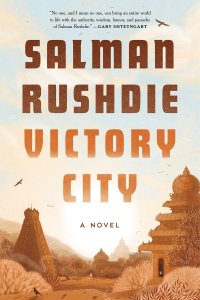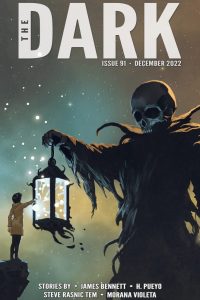Paul Di Filippo Reviews Victory City by Salman Rushdie
 Victory City, Salman Rushdie (Random House 978-0593243398, hardcover, 352pp, $30.00) February 2023
Victory City, Salman Rushdie (Random House 978-0593243398, hardcover, 352pp, $30.00) February 2023
Salman Rushdie’s new novel is an un-put-down-able narrative feast, rich with character, incident, aphorisms, and meditations on morality, life, and death. It’s a saga so rich and authentic, narrated with so much fluency and ceaseless invention, that it ranks with the other Ur-romances that Rushdie alludes to, such as the Ramayana. Flavors of The Thousand and One Nights, The Tale of Genji and Dream of the Red Chamber also season the pot. Suffused with hard-won, bittersweet wisdom and Olympian humor (that does not balk at sometimes descending into sheer silliness), it’s a book that could emerge only from a mature writer with decades of past foundational accomplishments. If anything can partly solace Rushdie for the horrific injuries he sustained in 2022, it would be the sure knowledge that he’s turned in a work guaranteed to be adored by many.
What is the book about, in a nutshell? It’s the history of an imaginary empire named Bisnaga (which is also the name of its capital city). “Bisnaga” is a corruption, by a European, of Vijayanagar, the local Hindu phrase meaning “city of victory.” Right away, we note themes of cross-cultural influences and irony, given that this uncolonized, highly nationalistic and independent place adopts its twisted name from a European’s lips. But Rushdie is highly nonjudgmental, showing us that this phenomenon and its ilk have been—and will always be—simply the way that cultural cross-pollination works. The whole human race is in one big olla podrida.
In any case, the appellation is highly appropriate, for much of Bisnaga’s history—which will stretch over nearly 250 years, all of which we get to see, with some necessary moments of compression—involves warfare, mainly victorious (except for that final campaign of defeat that undoes everything). With accompanying internecine familial rivalries, it’s rather like a subcontinental Game of Thrones. Except that unlike GRRM’s saga, Rushdie’s tale gives equal screentime to myth, romance, fabulism and comedy.
In a sense, Victory City is part of the grand tradition of Ruritanian tales: stories where the imaginary country/city assumes nearly as much prominence as the characters and plot. Readers will recall such landmarks as The Malacia Tapestry, Last Letters from Hav, Kalpa Imperial and Malafrena. Rushdie’s work holds up its head proudly in such fine company.
Before getting into the actual plot (not all of which can be revealed here, for fear of spoilers), we should mention the apparatus surrounding the telling. First, there is a modern narrator who introduces everything. He or she reveals that an ancient Sanskrit manuscript was recently discovered, the Jayaparajaya. This account was the work of one woman, Pampa Kampana. What we are reading is a modernization and translation. So the contemporary scholar will occasionally interpolate and interject during the telling. But mainly the tale is conveyed with the immediacy of the primary creator, immersing the reader in a you-are-there ambiance. One last fillip: we learn towards the end of the book that in her later years Pampa Kampana used a scribe, while she recited the story, and that the scribe might have altered things for her own purposes without Pampa knowing. These layered narrators add a piquancy, but never amount to recursive metafictionality. The book is as straightforward and propulsive as any classic old-fashioned historical novel.
The year is sometime in the fourteenth century AD, in India. A nine-year-old girl, Pampa Kampana, is orphaned by war. She comes to live with a lecherous monk, Vidyasagar, who abuses her. Having had an encounter with and possession by a deity, leaving her with nascent magical powers, Pampa abides her time until she is eighteen, focusing on attaining wisdom.
At that point she meets two ex-soldiers, deserters, brothers named Hukka and Bukka. (I did say Rushdie could be delightfully goofy, as in this “Hucklebuck” riff.) The boys want a kingdom, and Pampa is now ready and itching to create. From a bag of magic seeds she sows a whole city and its citizens, like dragon’s teeth. Thus is Bisnaga born. All Pampa has to do is to magically whisper their backstories into the brains of the androids, and the place is up and running, with Hukka as the King and Bukka as a prince.
(Given Rushdie’s desire to comment on religion, it’s no surprise that this origin story pokes fun at the creationist rationale that explains away fossils as being instantly instantiated in place five minutes ago when the whole world was also laid down.)
Now we strap ourselves in for a ride of two hundred and fifty years. Pampa has been granted extreme longevity, retaining her youthful beauty almost to the point of her ultimate death, and she moves through the tale like Haggard’s She or Moorcock’s Gloriana. Both mortal woman and demiurge, but far from omnipotent, she pulls strings, get thwarted, rebounds, falls in love (often with a succession of European visitors who “all look alike”), goes into exile, bears children, returns to the top of the heap, then falls as far as it is possible to fall.
But although Pampa is the engine of everything, Rushdie devotes fully as much attention to the other characters. We get vivid portraits of everyone from the rulers on down to the lowliest marketplace vendors. Bisnaga comes alive across the whole sensory spectrum, and its history is both unpredictable yet always fated to converge on tragic defeat. But what a ride.
Rushdie’s dialogue and the mindset of his characters is authentically premodern. These are folks closer to the primal wellsprings of civilization than we are in 2023. Now and then he indulges in some anachronistic talk—“You should put on manly clothes and give up this girly garbage.”—but generally his prose is suitably archaic without being stilted or overwrought.
Pampa Kampana had begun to despair, but then one Friday morning when the earth was trembling because of the weight of marching feet, both human and animal, and when the dust cloud enveloping the army of Zafarabad was visible in the near distance, Bukka pulled himself together, marched out of his private quarters in full, clean battle array, and cried out, “Let’s give that Ghost Sultanate a welcome that will make them scurry back to Ghost World.” Though he had never been a large man, he rode through the streets of the city like an angry colossus and then at the head of his troops he led the charge into the sultan’s army screaming a scream so terrifying that even that regiment of ghost soldiers, if that was what they were, could think of nothing except to flee as fast as possible and in complete disarray.
Rushdie’s overt feminist slant—Pampa encounters much anti-female prejudice, and dreams of replacing the patriarchy with a dynasty of brilliant daughters—is never tendentious, but adds a nice twist to such an otherwise ancient tale.
Rushdie’s powers of invention are unflagging, and he reels off one unpredictable yet inescapably mandated incident after another. There are unforgettable moments aplenty, such as Pampa’s exile to a monkey-plagued forest, and the reader will be enthralled by the procession of magic and the quotidian moments.
Rushdie uses the term “golden age” several times, and while he does extol the brighter moments, an overall miasma of fated decline suffuses the tale. “When people start talking about a golden age…they always think a new world has begun which will last forever. But the truth about these so-called golden ages is that they never last very long. A few years, maybe. There’s always trouble ahead.”
Certainly Pampa’s biographical arc mirrors this geopolitical reality. She ends in dismay and disgrace—but maybe without any real regrets, since she played her hand well. She’s gone blind (hence the aforementioned scribe), a detail which cruelly half mimics Rushdie’s own loss of vision from his recent attack. Like Pampa, our own demiurgic Rushdie know both the exaltations and the shattering limits of birthing a story kingdom.
 While you are here, please take a moment to support Locus with a one-time or recurring donation. We rely on reader donations to keep the magazine and site going, and would like to keep the site paywall free, but WE NEED YOUR FINANCIAL SUPPORT to continue quality coverage of the science fiction and fantasy field.
While you are here, please take a moment to support Locus with a one-time or recurring donation. We rely on reader donations to keep the magazine and site going, and would like to keep the site paywall free, but WE NEED YOUR FINANCIAL SUPPORT to continue quality coverage of the science fiction and fantasy field.
©Locus Magazine. Copyrighted material may not be republished without permission of LSFF.






